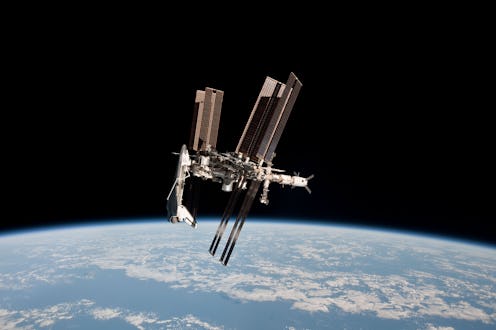News
An Earth-Like Planet Was Just Discovered
In case you were ever worried about the world ending (cue Britney Spears), astronomers have now made a groundbreaking discovery of a brand-new exoplanet — meaning, a planet situated beyond the Solar System. They've named the exoplanet Kepler-186f, and it's likely very similar to planet Earth. For this, we can thank NASA's Kepler Space Telescope, which allowed the astronomers to see Kepler-186f orbiting in a "habitable zone," which is roughly defined as the area around a star in which liquid water can form on a planet.
While the astronomers still don't know the exact mass of Kepler-186f; if it has water; or if its atmosphere is habitable, they think its existence could mean that there might be other exoplanets closer to Earth than we have yet to discover.
“This is an historic discovery of the first Earth-size planet found in the habitable zone around its star,” UC Berkeley astronomer Geoffrey Marcy told the Los Angeles Times in an email. “This is the best case for a habitable planet yet found. The results are absolutely rock solid.”
So far, Kepler-186f seems to be slightly larger than Earth, and it's also part of a "mini solar system" that exists called Kepler-186, which orbits around a red dwarf. Researchers previously discovered that exoplanets in that system —catchily named Kepler-186b-e — are incredibly close to the red dwarf they orbit and therefore too hot for anything to survive there.
But Kepler-186f orbits further out than other similar exoplanets that have already been discovered, and that's precisely why astronomers think that they've stumbled upon the first exoplanet in a goldmine of habitable exoplanets.
Kepler-186f orbits the red dwarf about every 130 days, but doesn't really receive that much amount of light. To put it into perspective, NASA's website states:
On the surface of Kepler-186f, the brightness of its star at high noon is only as bright as our sun appears to us about an hour before sunset.
Basically, this means that the exoplanet is not as habitable as it could be. That said, it is still a huge discovery, although, according to a research scientists who co-wrote the paper on the exoplanet, "Kepler-186f can be thought of as an Earth-cousin rather than an Earth-twin. It has many properties that resemble Earth."
We'll have to await further information on the exoplanet to confirm whether or not it's truly habitable. For now, here's an artist's concept of Kepler-186f.
